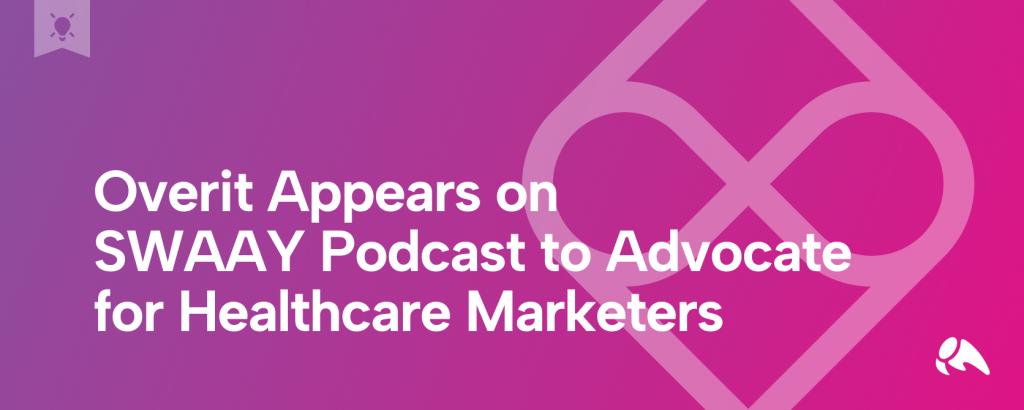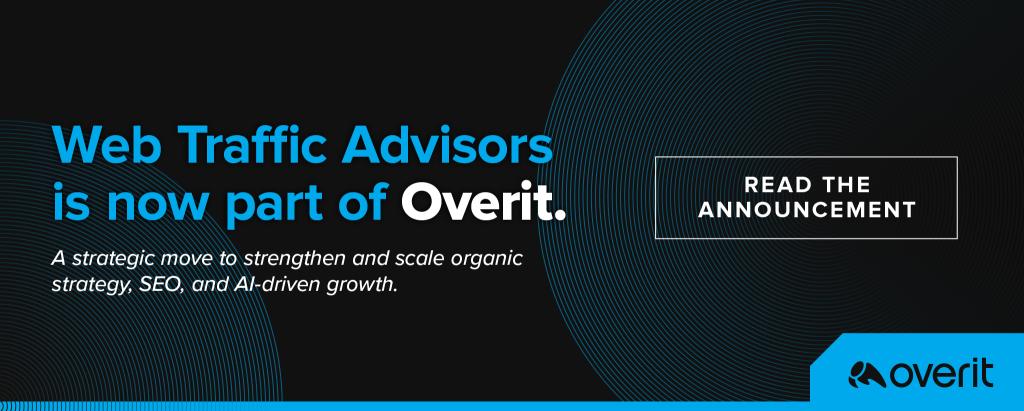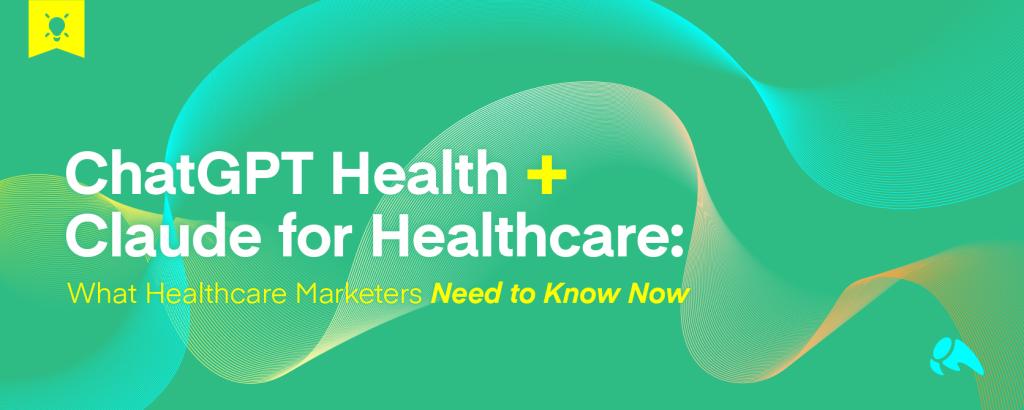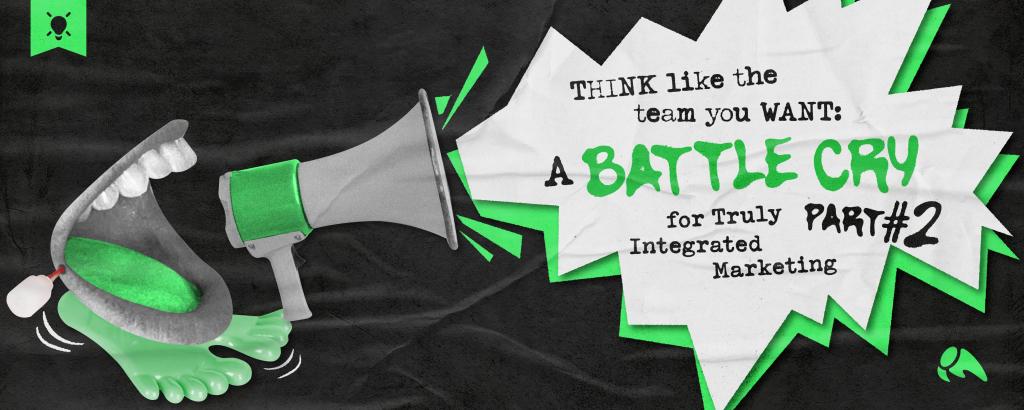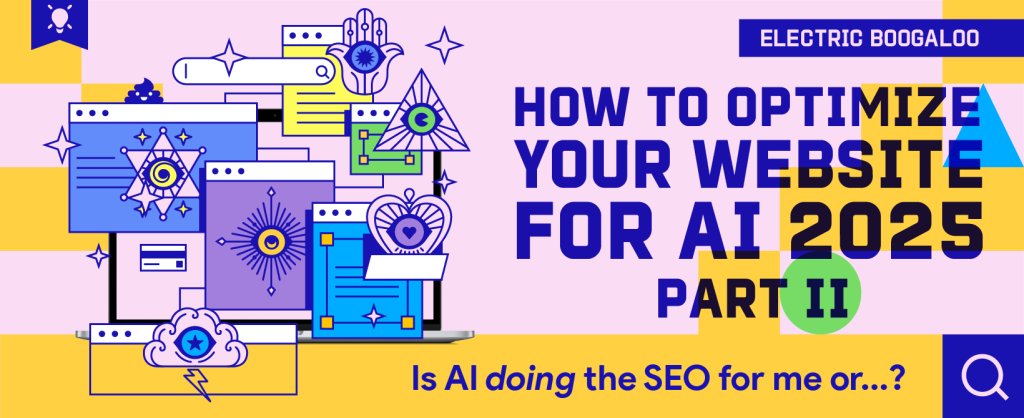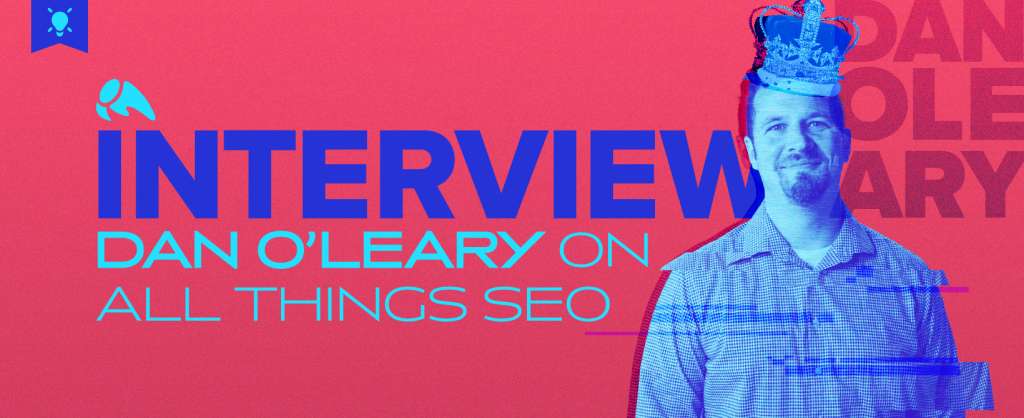
SEO (Search Engine Optimization) needs to be a priority for all businesses. Because SEO contributes to your brand visibility online, without it, your audience won’t find you.
I don’t know about you, but it feels like SEO is constantly changing, and it’s a bit hard to keep up with.
Since SEO can be a little complicated, I decided to interview Overit’s very own SEO expert, Dan O’Leary.
Tell us a little bit about your background and expertise
DJO: I’ve been working in Digital Marketing and Digital Analytics since June 2011, so this summer will be my 13th year doing this! The very first marketing channel I specialized in was SEO. Although I’ve expanded my experience into several other marketing channels since, SEO remains a “cornerstone” of my knowledge base and expertise. Before becoming a marketer, I worked in higher education as an adjunct professor in writing and communications. My academic background was in teaching, literature, and writing; I have a Master’s Degree in Teaching/Education. But with 12 years and counting now, SEO is my longest career.
What exactly is SEO?
DJO: SEO stands for “search engine optimization.” To me, it means the art and science of fostering “organic” (free, not paid) visibility on search engines for websites. For many websites and users today, that means improving visibility in Google search results. However, SEO as a discipline predates Google, and if Google were to disappear tomorrow, there would still be SEO. Besides Google, other valuable search engines that can drive meaningful website traffic include Bing, Duck Duck Go, Yandex, and others.

How does SEO impact brands?
DJO: For websites with strong brands, users will often search for them directly by name. These branded organic searches are a foundational and stabilizing source of traffic and users for brands’ websites. However, for brands with customer satisfaction or brand reputation issues, SEO can present a double-edged sword, as negative sentiment can easily attach itself to the brand name in the search results.
Finally, for brands that also have visibility for non-branded searches that are highly relevant to their objectives, SEO can drive qualified traffic and users to the website who may have little to no prior knowledge of the brand. However, these non-branded searches tend to be quite competitive, as all of the brands who compete for that market segment want to appear higher in those search results. In our experience, a healthy mix of branded and non-branded search visibility offers a diverse, safer traffic profile.

How do you keep up with the constantly changing Google algorithms?
DJO: Google releases minor updates to their algorithm daily. But there are larger and more meaningful updates at least 2-3 times a year that definitely impact the overall search landscape. It’s important first to learn discretion in which updates are even worth reading about.
To help business owners discern what’s important, what it means, and how to put it into practice, I deliver a video SEO Brief that distills the most important updates from search each quarter. More on that below!
I read a variety of online industry publications that I’ve followed for years, including:
- Search Engine Land,
- Search Engine Journal,
- Search Engine News,
- Search Engine Roundtable,
- Search Engine Watch
All of these are updated regularly with news, commentary, and analysis from search community members. They also contain a trove of value for OTHER marketing channels, including SEM/paid search (SEO’s step-sibling), social media, video, email, and others.
I also follow many professional SEOs online, some of whom I know and others I’ve never met but respect and admire. The Twitter SEO Community in particular, is a very thriving, very diverse scene and offers a mix of opinions and perspectives on ANY SEO topic, no matter how small or minor, (LOL).
What can businesses do immediately to improve SEO?
DJO: What businesses can do to improve their SEO depends on the organization, their business model, and current SEO “maturity.”
For regional to national businesses, it can take YEARS for a website to rank on Page 1 of Google for the terms it desires, if ever. SEO is a very competitive channel that takes the longest time span or runway before gains fully realize and translate to meaningful traffic and revenue for the business. For these businesses, the best place to start is always with a comprehensive SEO Audit.
This will allow the organization:
- To conduct keyword research and understand what kinds of searches their potential customers conduct online
- To assess their visibility for these terms and compare it to the competition
- And then to gauge their website’s setup, organization, and overall performance and how well they align with current SEO “Best Practices”
A strong SEO Audit will look at technical SEO issues in addition to the on-page SEO practices described above, and may also examine an organization’s Offpage SEO (backlinks) profile as well. All three areas of SEO (Onpage, Offpage, Technical) are cornerstones or “pillars” for an organization’s overall organic search visibility, and glaring weaknesses in one will inhibit the impact (and ROI!) of the others. Coming out of the audit, a regional to national business can then devise multi-year strategies that fix or improve areas of opportunity identified within the audit, along the three main “pillars”. These multi-year Strategies can then be further broken down into more “tactical” initiatives, laid out per quarter or month.
For smaller and more local businesses, however, the path to Page 1 visibility might take far less time and effort: a year or two or less. If a business is local and has a “brick and mortar” location, the best “easy win” available to them is to secure and optimize their Google Business Profile (formerly Google My Business). The Google Business Profiles (GBPs) are what appear in Branded searches and also in Google’s “Map Packs” that show a variety of nearby businesses relevant to the user’s search. The GBP displays key business information such as name, address, phone number, hours of operation, a link to the website, and can also contain user reviews as well. Businesses can also upload photos, videos, and other “value adds” to their Google Business Profile, so FULLY optimizing the GBP is an often overlooked or neglected opportunity. Before doing anything else for SEO, local businesses should always maximize their GBP first.
What is your number one SEO tip for brands to improve website visibility?
DJO: I always tell brands and clients that your brand name is the most straightforward keyword to rank for. There is (typically) little to no competition for brand names in organic search results and most organizations can easily “own” most to all of Page 1 on Google with their website, Google Business Profile, their social media accounts, and a few good reviews on a 3rd party review platform.
Develop and run a business that HAS a strong, compelling brand, and users will instinctively look for you by name. That branded traffic will be steady and something you can rely on and build upon as you begin to compete for the more competitive, non-branded terms that your ideal customers search for when they don’t already have a brand in mind.
For businesses who have localized stores or have localized services, what strategies would you recommend for localized SEO?
DJO: As mentioned earlier, the first place I would recommend starting is with the Google Business Profile. There’s a LOT of juice to squeeze there for most businesses, even those who already have GBPs. The second place to examine is third-party review sites that often appear in search results, particularly when users are searching for information or reviews on a business they’ve found online but have never done business with.
The specific 3rd party review sites will vary by business type or vertical, but some very common ones include: Yelp, Angies (List), Thumbtack, NextDoor, and others. Be aware of both positive and negative reviews on these other platforms and websites, in addition to the Google Business Profile reviews we just mentioned. Have a “script” or “playbook” for responding to and dealing with negative reviews in particular.
How can a business optimize their SEO efforts for mobile?
DJO: There is actually less and less distinction or difference these days between optimizing for mobile versus optimizing for desktop. Google and other search engines actually utilize a “mobile only” framework, where they now crawl and index your website as a mobile browser/user would see it, even if your traffic comes heavily from desktop users. The rankings rarely, if ever, change between desktop and mobile search results.
However, if an organization has a particularly old or outdated website, then they may not have a “mobile-friendly” website to begin with, which could certainly inhibit its ability to appear in the search results. 10 years ago, organizations maintained separate “versions” of their website for mobile users, such as m.example.com, with the “m” being for “mobile”.
These days, however, designers and developers simply use what’s known as Responsive Design. They develop ONE website and code into that website instructions on how to rearrange the page elements for any kind of screen size, small or large. If your site is built according to Responsive Design principles, then your site is mobile-friendly and should have no issues appearing in mobile search results. Beyond that, the only other mobile-specific factors I would pay attention to are called Core Web Vitals, which are performance metrics for mobile load times, stability, and performance. These are used by Google’s ranking algorithms, but they are still quite a minor ranking factor at best.
Do online reviews help with SEO?
DJO: It depends on what we mean by “help with SEO.” Online reviews will mostly impact branded searches, so they will have little to no impact whatsoever on an organization’s visibility for relevant and valuable non-branded searches.
For Branded searches, however, these reviews WILL often display in the search results right alongside the brand’s website. These outside reviews are not helping the brand’s website rank on Page 1 any higher, BUT they can certainly impact a potential customer’s perception of the brand and their readiness/desire to do business with them. Having more good reviews than bad, and responding properly to bad reviews, will help ensure that organizations are maximizing the value and ROI of a branded search.
Is “link building” still a thing?
DJO: Yes, link building is still a thing and appears to remain as such for the near future. Despite all the technical and on-page SEO opportunities available to websites and brands, perhaps the most significant set of ranking factors still involve backlinks. These are links from outside, 3rd party websites that link to YOUR website. Google and other search engines have long utilized backlinks as a proxy for Expertise, Experience, Authority, and Trust (EEAT). Both the quality and quantity of backlinks pointing to your website are very strong predictors of overall search engine visibility.
In 2023, we at Overit prefer to think of it as “link earning” versus “link building,” however. Strategies that OVER emphasize the importance of backlinks tend to try and aggressively “build” or “create” them where they otherwise might not exist, and such efforts begin to lean towards search engine “manipulation” versus “optimization”. Google and other search engines are constantly on the lookout for backlink “spam” and low-quality backlinks. They have many related algorithms to detect and neutralize or even penalize link-building “schemes” that violate their Webmaster Guidelines and Terms of Service.
The best and safest backlinks are FREELY GIVEN by other websites because the content they are linking to is awesome and offers THEIR readers/visitors value. Avoid link-building strategies that take shortcuts or directly violate Webmaster Guidelines.
Can you give us “the spark notes version” of keyword research and why it’s important?
DJO: Keyword research is the process of identifying specific search terms/phrases that an organization’s prospective customers (or visitors) will search for (keywords). It also involves grouping and classifying these individual keywords into broader types of keywords, based on the user intent. Finally, keyword research also attempts to quantify these findings by approximating the number of searches for these keywords and the estimated number of clicks that a website could secure from them. These metrics/data dimensions to keywords are essential for forecasting, benchmarking, and demonstrating value/ROI of organic search as a whole.
Keyword Research is important for two main reasons. First and foremost, they provide organizations with important audience/customer analysis. Marketers seek to understand their audiences and customers and will take great lengths to create personas for different audience segments.
Well, keyword research is a vital but often overlooked (or forgotten!) piece of persona development. The actual words and phrases different audiences use online reveal a LOT about them: who they are, what they want, where they live, what matters to them in the buying cycle, and more. Keyword research gives content writers specific language markers they should build into their copy/content AND gives them insights into the psychological and emotional needs of the searchers. Organizations do NOT have fully developed personas unless they include keyword research and analysis in their persona development. How we speak and write when we search, particularly in private, is very telling and something focus groups and interviews will never be able to fully replicate or approximate.
The second reason Keyword Research is important is that it informs on-page SEO optimization. As mentioned just before, effective keyword research will not only identify WHICH terms organizations should “target” or want to rank for, but it provides content teams with the very words, descriptors, and ACTIONS that searchers use, and that should be incorporated into the website’s content, organization and layout.
I’ve trained several dozen Junior SEOs or colleagues in SEO 101, and I ALWAYS start with keyword research. To me, it is the single most foundational skill an effective SEO must have in his or her toolbox. No matter how skilled in the many other areas of SEO, if a SEO stakeholder does not have strong keyword research skills and experience, they are not a fully developed or truly effective marketer. I’d rather work with SEO’s who could ONLY do Keyword Research versus any other skillset or resume bullet point.
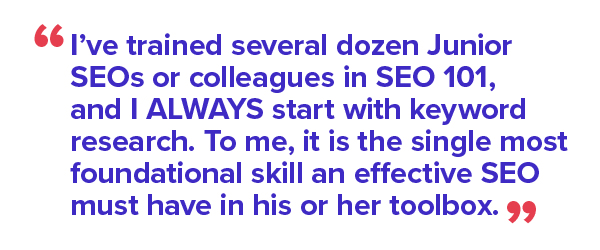
Will you tell us about the quarterly SEO Brief that you put out?
DJO: Yes! As we mentioned earlier, there are many changes to Google’s search engine algorithms and results, both minor and major. And while I love reading and learning from other full-time SEOs online, I’ve often found their analysis and content geared more towards OTHER SEOs than non-SEO stakeholders who still need to understand the high-level shifts and overall landscape of search for their jobs.
I wanted to create an SEO content series geared towards non-SEOs, particularly small business owners and smaller marketing teams that don’t have the time or inclination to sift through dozens of Twitter threads or blog posts to find value and actionable insights. We developed the Overit SEO Brief for these overlooked audiences and now every quarter I specifically “curate” the most important stories in the world of search and distill it down into accessible, digestible video content. We tell you what happened, why it matters, and what you can or should do about it. And we cover each topic in a few minutes each, so even with 3-5 topics each month, you don’t have to spend more than 10 minutes to educate yourself.
Do you love what you do? Why? What do you love about SEO?
DJO: Yes! Otherwise, I don’t think I’d still be doing it after a dozen years.
The thing I most love about SEO is that it’s a job that best utilizes my different skill sets and personality characteristics. While I did go to college for literature/writing, I’ve also always been very good at and very interested in math, particularly data analysis and statistics. One of my very earliest memories is looking at baseball cards and the stats on the back of them, and learning to re-calculate batting averages for players after each at bat. So I’ve always been a “data-driven” person, even before that was a marketing buzzword. SEO allows me to blend the data/empirical side of me with the content/psychology part of me that is also critical to marketing. They are my Yin and Yang and I’m forever balancing them and growing them within my work.

The second thing I love the most about SEO is how I get to work with other departments. Most days and weeks, I work closely with members of other departments or roles. This includes paid search and paid advertising teams, web development and/or programming teams, content writers, PR specialists, and more. SEO sometimes has a reputation for being “siloed”, which I’ve never frankly understood. To get stuff done, I HAVE to rely on and work with and across departments and roles. I love working with these other teams and hearing their perspectives and LEARNING from them. A good web developer can teach an attentive SEO a LOT about their job without even trying. The same can be said for a gifted copywriter.
Finally, the last thing I love about SEO is the overall mix and flow of activities and projects. SEO, in general, has a lot of different parts and pieces which offer variety, but working with different clients and businesses also presents completely NEW challenges and learning opportunities. In my 12+ years of working as an SEO, I’ve had the pleasure and benefit of working exclusively within 2 agencies that entire time. I’ve never worked exclusively on JUST ONE website or business model. I’ve been able to work with hundreds (if not thousands) of clients and websites all over the spectrum. I’ve worked in every major vertical type (B2C, B2B, B2O, affiliate, MFA, etc) and dozens and dozens of specific industries. I’ve been able to see and learn how these businesses operate inside and out, and it’s often felt like the equivalent of an MBA for me. I like working with CMOs one day and then a small mom-and-pop business owner the next. I like working in a spreadsheet all day on Monday, then giving a presentation in the middle of the week and wrapping up the week with cross-departmental meetings and brainstorming sessions. Every day is something different, if not entirely new, and I never get bored with it.
Ready to power your SEO efforts with the help of an expert? Contact Overit today for a free consultation!
